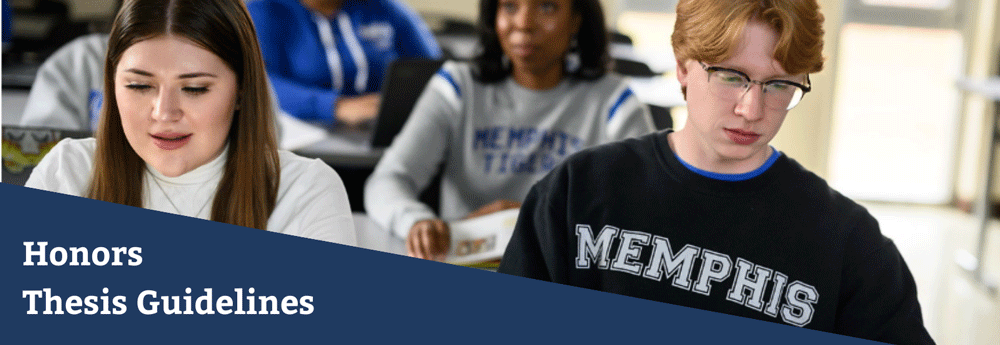English Honors Thesis Guidelines
 Scheduling
Scheduling
- You should meet with your Thesis Director regularly throughout the research semester.
- Submit the English Honors Thesis Application before the last day of classes in your research semester. Your form must be submitted by the last day of classes for you to be issued a permit to write the thesis in the following semester.
- Set up a schedule of intermediary deadlines and conferences with your Director to discuss research, and, once you begin writing, sections of your initial draft.
- Submit your Thesis Prospectus by the last day of classes in your research semester. The prospectus must be approved by your Director before submitting it to the Director of English Honors. You may email your approved prospectus as a Word attachment to the English Honors Director at englishhonors@memphis.edu.
- Expect to write multiple drafts of at least some sections of your thesis.
- Always allow your Director ample time to read your manuscript and suggest corrections.
- After your Director has approved your final draft, your Second Reader may also suggest changes. Allow two weeks for the second reading and your final corrections. Never give a draft to your Second Reader without previously consulting with your Thesis Director.
- Submit the thesis to the English Honors Director by the last day of classes during the semester in which you are enrolled in the thesis course (ENGL 4996) by uploading your thesis to Canvas. You must additionally submit your thesis to the electronic Honors Thesis Repository. See instructions from the Helen Hardin Honors College here.
 Length:
Length:
- Theses are typically 30-40 pages; they may be longer, and some (particularly those consisting of poetry) may be shorter. Ultimately, the thesis will be of the length appropriate to the subject as proposed by the student and Director and approved by the English Honors Committee.
 Format:
Format:
- Formatting guidelines for the final thesis draft are provided in the Helen Hardin Honors College Honors Thesis Manual. The Department of English does not require a particular method of binding, but we do require consistency in both citation style and formatting throughout the thesis.
- You must submit a signed Thesis Acceptance Form with your completed thesis.
- For thesis organization options, see Prospectus Guidelines.
 Topics:
Topics:
Students design topics with assistance from their Directors. Possible types of inquiry include:
- Original research, in which the student works with primary documents previously untreated by scholars, such as journals, letters, and other types of private writing, in combination with interviews where appropriate; field research in linguistics or ESL; empirical studies in professional writing.
- Scholarly argument which casts a new view on an old topic.
- Review of a substantial body of material (literature, field research, document analysis, theoretical schools, etc.) representing primarily new knowledge for the student, with a presentation that synthesizes, evaluates or discusses its implications.
- Original work in fiction, poetry, or creative nonfiction.
- Students should work on a topic within their declared English concentration.
For further guidance in selecting a topic, see advice!


